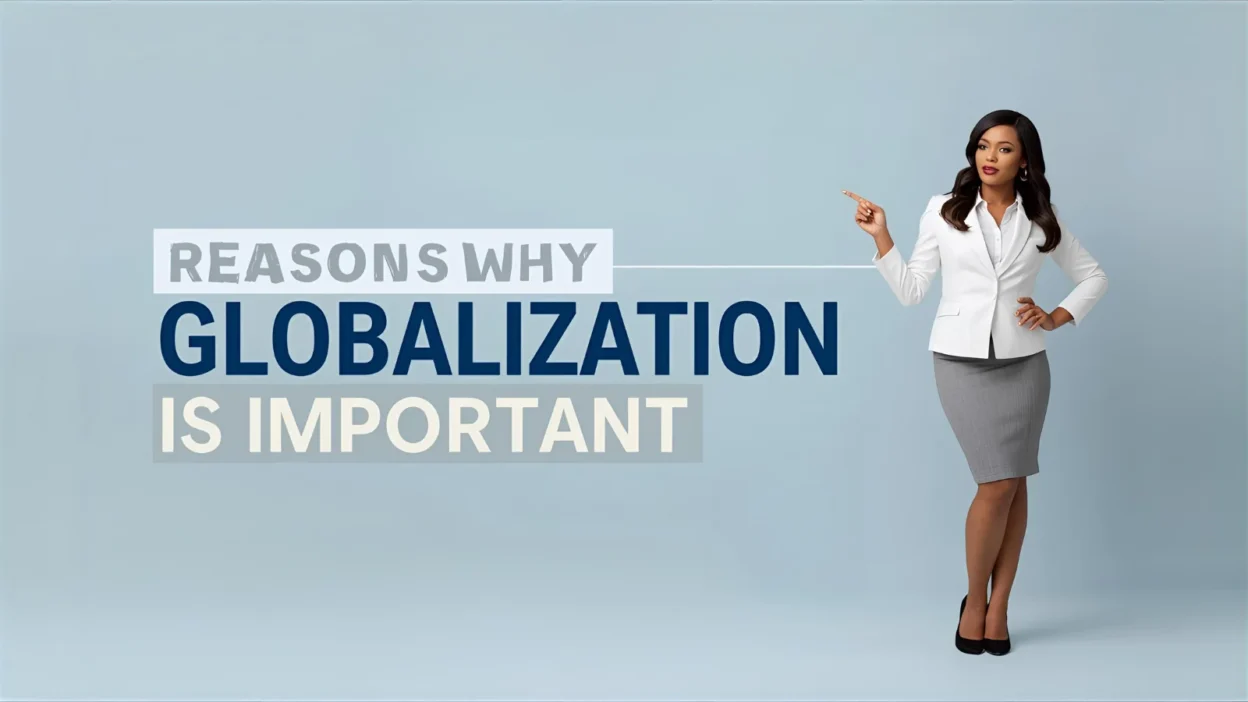Globalization is one of the most powerful forces shaping our lives today. From the clothes we wear to the food we eat, from the music we listen to on streaming platforms to the technology in our hands—everything is connected. But globalization isn’t just about trade and travel; it’s about ideas, culture, cooperation, and progress.
This article explores the reasons why globalization is important for individuals, societies, and the entire planet.
Understanding the Meaning of Globalization
At its core, globalization refers to the process of increasing interconnectedness among countries through trade, technology, culture, and communication.
- Goods and services move across borders faster.
- Information spreads instantly.
- People connect regardless of distance.
- Cultures exchange and evolve.
📌 Definition: Globalization is the integration of economies, cultures, and societies across the globe through communication, technology, and cooperation.
The Psychology of Globalization
Beyond economics, globalization impacts the human mind:
- Expands worldviews – exposure to diverse cultures reduces prejudice.
- Encourages empathy – people understand struggles and successes worldwide.
- Boosts curiosity – learning about global lifestyles broadens perspectives.
- Builds unity – fosters the feeling of being part of something larger.
💡 Globalization changes not only how we trade, but also how we think.
Reasons Why Globalization Is Important in Daily Life
Globalization affects everyday living in ways we often don’t notice:
- Food variety – sushi in New York, pizza in Karachi, tacos in London.
- Technology access – smartphones made with parts from multiple countries.
- Entertainment – Hollywood movies, Korean dramas, Bollywood music on the same platforms.
- Fashion trends – global brands and fast fashion.
- Jobs and opportunities – remote work and international collaboration.
🌱 Example: A teenager in Africa can learn coding online from a teacher in Europe, using a device made in Asia.
The Economic Importance of Globalization
Globalization drives economies forward:
- Expands markets – businesses reach global customers.
- Creates jobs – multinational companies employ millions.
- Encourages innovation – competition inspires new products.
- Boosts trade – imports and exports strengthen economies.
- Lowers costs – global supply chains reduce prices for consumers.
💰 Without globalization, our access to products and services would be limited and more expensive.
Cultural Importance of Globalization
Culture is enriched through global exchange:
- Art and music cross borders—K-pop, jazz, salsa, Bollywood.
- Fashion trends spread globally.
- Languages are learned faster due to digital platforms.
- Cultural festivals are celebrated worldwide (e.g., Diwali, Christmas, Ramadan).
🌍 Globalization doesn’t erase cultures—it helps them interact and inspire.
Globalization and Education
Education thrives with globalization:
- Access to knowledge – online learning platforms connect students everywhere.
- Cultural exchange programs – students study abroad.
- Research collaboration – global scientists work together on medicine, climate, and technology.
- Language learning – English, Chinese, and Spanish spread through cultural exchange.
✨ Global education means ideas are no longer limited by geography.
Real-Life Examples of Globalization’s Impact
- McDonald’s adapts menus to countries (veg burgers in India, teriyaki burgers in Japan).
- Spotify and Netflix spread global music and movies.
- International space missions involve scientists from many countries.
- UN collaborations help fight global issues like climate change and pandemics.
🌟 Globalization creates shared stories and shared progress.
Globalization and Technology
Technology is the fuel of globalization:
- Internet and social media connect billions daily.
- E-commerce enables instant buying from global sellers.
- AI and robotics spread innovations quickly.
- Digital banking makes international payments easier.
📌 Without globalization, the pace of technological advancement would slow dramatically.
The Political Importance of Globalization
Globalization shapes politics and global governance:
- International organizations like the UN, WHO, and WTO manage cooperation.
- Peacebuilding efforts rely on diplomacy and dialogue.
- Global policies address climate, health, and trade.
- Human rights awareness spreads across nations.
💡 Politics is no longer local—what happens in one nation often impacts others.
Challenges of Globalization
While important, globalization has its difficulties:
- Inequality – wealth often benefits richer nations more.
- Cultural erosion – local traditions sometimes fade.
- Job shifts – outsourcing may harm domestic workers.
- Environmental impact – global trade increases pollution.
- Overdependence – supply chain disruptions (like during COVID-19) highlight risks.
📌 Globalization is powerful, but it needs careful management.
How to Use Globalization Wisely
To maximize benefits while minimizing risks:
- Support fair trade and ethical brands.
- Promote cultural diversity alongside global trends.
- Encourage sustainable practices in production and trade.
- Strengthen local industries while engaging globally.
- Balance global identity with local heritage.
🌱 Globalization should mean exchange without exploitation.
Idioms and Expressions Related to Globalization
- “It’s a small world” – everything feels connected.
- “World at your fingertips” – access to global information.
- “Think globally, act locally” – consider global impact while acting in local communities.
- “Breaking boundaries” – overcoming limitations.
- “Borderless world” – describing interconnected societies.
Synonyms for Globalization (with Usage Examples)
| Synonym | Example Sentence |
|---|---|
| International integration | International integration has boosted trade. |
| Global interconnectedness | Global interconnectedness allows instant communication. |
| Worldwide exchange | The worldwide exchange of ideas fuels innovation. |
| Cross-border cooperation | Cross-border cooperation is essential in peacekeeping. |
| Global unity | Global unity is needed for climate action. |
Grammar Note: “Global” vs. “Globalization”
- Global (adjective): relating to the world.
- Climate change is a global issue.
- Globalization (noun): the process of connecting the world.
- Globalization has transformed business and culture.
📌 Mistake to avoid: don’t use “globalization” when describing an individual thing; use global.
The Future of Globalization
Globalization is evolving rapidly:
- Digital globalization – remote work, online education, global freelancing.
- Sustainable globalization – eco-friendly supply chains.
- Cultural inclusivity – stronger focus on diversity.
- Global governance – more cooperation on health, peace, and climate.
- Artificial intelligence – accelerating worldwide innovation.
🌍 The future of globalization is about balance—connection without harm.
FAQs About Why Globalization Is Important
Q1: Why is globalization important in daily life?
It gives access to diverse food, fashion, technology, and opportunities.
Q2: How does globalization impact the economy?
It creates jobs, expands markets, and boosts innovation.
Q3: Why is globalization important for culture?
It allows cultural exchange and preserves traditions through sharing.
Q4: What is the downside of globalization?
It can increase inequality, environmental damage, and cultural erosion.
Q5: Is globalization important for the future?
Yes—global cooperation is key for solving global challenges like climate change.
Conclusion
Globalization is not just an economic system—it’s a way of life. It connects nations through trade, culture, education, technology, and ideas. While it comes with challenges, its importance lies in how it opens opportunities, fosters unity, and drives progress.
The reasons why globalization is important are clear: it makes the world more connected, more innovative, and more collaborative. The goal now is to ensure that globalization works fairly, sustainably, and inclusively—for everyone.
As an old saying goes: “If you want to go fast, go alone. If you want to go far, go together.”

Bret Lee writes educational and research-based content for Whygenix.com, focused on clarity, accuracy, and explaining why concepts matter through simple, engaging, reader-friendly writing.




